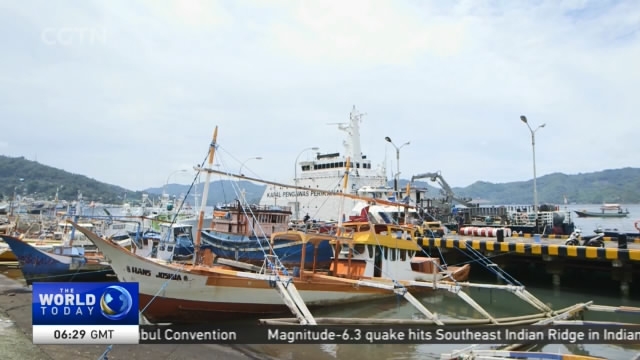
14:44, 25-Mar-2018
Indonesia Maritime Mapping: Navy aims to mark territories, protect conservation sites

The Indonesian government is beginning a new process of mapping its country's waters to help the nation identify natural resources available under the sea. President Joko Widodo says this is an important step for the country, as he continues to step up ways to increase foreign investment. CGTN's Silkina Ahluwalia has more.
Indonesia is the largest archipelago country in the world, with more than 17 thousand islands stretching across its coastline. Naturally, the nation is rich in coral biodiversity and important marine population. To better understand what lies below the surface of the country's oceans, Indonesia is now looking for proper ways to start mapping its sea territory. Naval patrols around the country's border are able to rely heavily on these maps.
HARJO SUSMORO, HEAD HYDROGRAPHY AND OCEANOGRAPHY CENTER OF INDONESIAN NAVY "It is very important for us to focus on both hydrography and nautical charts. We are moving towards the era of blue economy and to understand matters that are happening on the surface and deep within our oceans, we need hydrographic experts. Our team plays a vital role. Hydrography isn't just a matter of charting waters but it is the key to developing Indonesia's economy."
As of recently, the Indonesian government only relied on surveys conducted during the Dutch colonial era which was considered outdated. Updating the country's maritime map will be especially useful when constructing ports enhancing connectivity to further expand the country's shipping industry.
SILKINA AHLUWALIA JAKARTA, INDONESIA "By mapping Indonesia's Ocean wealth, the Ministry of Maritime are not only able to mark important territories. But it will also help them to deal with the nation's conservation priorities."
President Joko Widodo has a vision to turn Indonesia into a global maritime hub by focusing on developments to build the country's maritime infrastructures. This will help to increase foreign investment into the country.
POERBANDONO HYDROGRAPHY EXPERT "When you map or when you chart our waters, then you know what is in it and when you know what is in it then the investor will be able to calculate the risk of putting their money there to make the economy grow so without that information there will be no possibility of knowing what is in it, the depth for example, the speed of the current, the content of the seabed, the behavior of the sea level."
As a member of the International Hydrographic Organization, Indonesia has an important duty to keep surveying and charting their waters for both domestic and foreign needs. Silkina Ahluwalia, CGTN, Jakarta.

SITEMAP
Copyright © 2018 CGTN. Beijing ICP prepared NO.16065310-3
Copyright © 2018 CGTN. Beijing ICP prepared NO.16065310-3